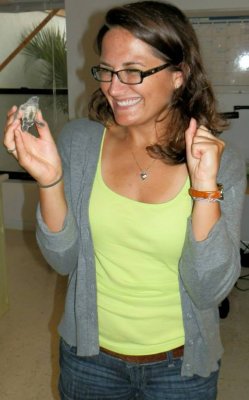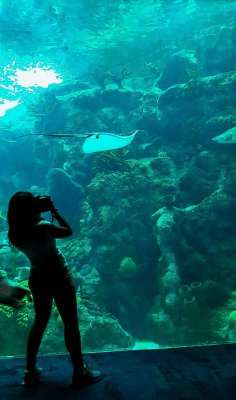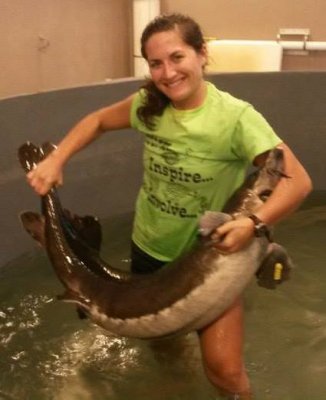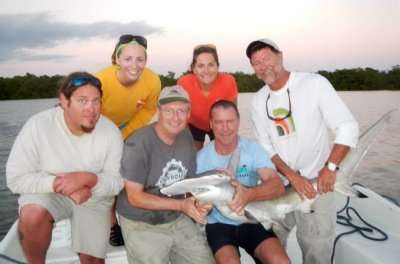It’s been argued that reef aquariums cannot inspire enough positive change to offset their environmental cost. As aquarists, we often argue that reef tanks can show young people the underwater world in vivid detail and perhaps persuade them to defend it. Critics argue that chances are, most that are exposed to reef tanks will be un-affected and certainly not inspired to fight to save our oceans. I have always disagreed with that sentiment. It was marine aquariums that inspired me to learn to scuba dive and travel around from reef to reef, across the planet. In doing so, I aligned with environmentally conscious divers and companies that were working to open minds to the plight of worldwide reefs.
However, I have watched as my own personal reef aquariums inspired a member of my own family to pursue a passion of oceanic life. As an only child, I don’t have any biological brothers or sisters, however my cousin Lauren (my mother’s sister’s daughter) has filled that vacuum entirely. When visiting, Lauren always had a keen interest in my aquariums and a desire to learn more about oceanic life. Inspirations she found from marine aquariums and visits to the seashore have led her on the path to become directly involved with marine animals. Recently, she accepted a job at the renowned Georgia Aquarium working on the life support systems that maintain a vast array of oceanic animals.
Often, we read that millennials are hard to manage and difficult to inspire. Corporate psychologists work overtime trying to figure out how to persuade millennials to assimilate with work life and become high producers. Millennials like Lauren turn this idea on its head and show that through passion, hard work and dedication, the millennial generation is ready to make an impact on the planet.
Oceanic inspiration:
Lauren grew up about two hours from where I did, in what is still considered Western Maryland. Both of us lived far from a seashore and made yearly family trips to the Outer Banks of North Carolina. The Outer Banks is a rich seaside community with a diverse abundance of oceanic life. Much of that life is highlighted at the Outer Banks Aquarium in Kill Devil Hills. Lauren was always interested in marine life, from catching crabs on the sand as a little girl, to studying my aquarium when she stayed with my parents one summer several years ago. Like me, Lauren was something of a wayward soul, curious about various aspects of life and slow to dedicate herself to something that didn’t ignite a passion within her.
When I began scuba diving, Lauren expressed a keen interest in exploring the underwater world. Often, she would ask me about various diving excursions, hungry for knowledge about what biological mysteries existed below the surface. At first, I assumed Lauren’s curiosity was comparable to anyone else’s when they learn that someone scuba dives. Though, over time, it was clear that she had a deeper interest in oceanic exploration and a greater appreciation of oceanic life.
In college, she decided to switch gears, moving into courses that studied both animal biology and marine biology as well. Eventually she began an internship at Pacific East Aquaculture (PEA), one of the hobbies’ longest running and most popular aquaculture outlets. She was in a prime spot to learn about oceanic life. She studied marine life at Salisbury University in Maryland, minutes from PEA’s facility and not far from Chincoteague Island, VA where our mothers own a condominium right on Chincoteague Bay.
During her time in Maryland, Lauren continued to deepen her breadth of oceanic experience. She worked in a facility that aqua cultured oysters, in addition to aqua culturing tropical corals at PEA. Eventually she made some major life decisions, leaving her friends and family in Maryland and moving to Florida.
Here, she began an internship at a facility that aqua cultured sturgeon. For a while, Lauren was officially a sturgeon wrangler, maintaining life support systems while checking the condition of growing fish. Moving into the field of marine biology isn’t easy. Many of the jobs available require a wide range of experience, leaving a young girl like Lauren with either unpaid or low-paid internships. This meant that to pursue her passion and compile a marketable resume, she had to work a second job in addition to a full-time internship.
In Florida, she did just that and eventually got a position with MOTE. MOTE Marine Laboratory is a non-profit marine research center in Sarasota. MOTE scientists are often on the cutting edge of marine research and have unlocked numerous mysteries surrounding coral reef health. Lauren worked to maintain the life support systems at the MOTE aquarium and even wrote about the procedure to manage red-tide when implementing natural seawater. Red-tide is a noxious algae bloom, common at various times on the Florida coast. Since MOTE relies on natural seawater to maintain water quality in their aquariums, red-tide presents a serious threat. To counter red-tide, MOTE uses ozone to kill off the noxious algae and sterilize the seawater. Since this requires a massive dose of ozone, the water must then be off-gassed, before it’s safe for aquatic life.
Georgia Aquarium:
Even though Lauren collected a great deal of experience in Florida, I would argue that her adventure in marine biology is just beginning. Not long ago, she applied for a job with the Georgia Aquarium, a facility that among aquarists needs no introduction. The aquarium, in Atlanta, remains one of the premiere public aquariums on the planet. The position had over 500 applicants from all over and the competition was fierce. This is another challenge people entering the marine biology world face, as most positions are highly sought and require a specific set of talents.
Her education, experience, positive attitude and strong work ethic prevailed and she got the position. Just a few weeks ago, Lauren loaded her belongings in Florida into a U-Haul and made the trek from Sarasota to Atlanta. She will now be managing life support systems for a wide range of sea creatures, working at a premiere public aquarium. Georgia Aquarium will likely provide her the tools to maximize a presence in the world of marine biology and oceanic impact. In addition to the public aquarium, Georgia Aquarium leads conservation and research efforts all over the world.
A reminder:
Lauren’s story is more than just a highlight of what passion and hard work can accomplish. It reminds us that our aquariums are more than boxes of water, but windows into an enticing alien world and one that needs protected and studied. Each time someone new stares into our aquariums, it’s quite possible that a powerful desire is ignited and they will go on to make an impact in oceanic health or exposing the public to the wonders of the sea.
Given Lauren’s youth, it’s hard to say where her career in marine biology will take her. However, it’s wonderful to see young people willing to work hard and make an impact on the natural world.
However, I have watched as my own personal reef aquariums inspired a member of my own family to pursue a passion of oceanic life. As an only child, I don’t have any biological brothers or sisters, however my cousin Lauren (my mother’s sister’s daughter) has filled that vacuum entirely. When visiting, Lauren always had a keen interest in my aquariums and a desire to learn more about oceanic life. Inspirations she found from marine aquariums and visits to the seashore have led her on the path to become directly involved with marine animals. Recently, she accepted a job at the renowned Georgia Aquarium working on the life support systems that maintain a vast array of oceanic animals.
Often, we read that millennials are hard to manage and difficult to inspire. Corporate psychologists work overtime trying to figure out how to persuade millennials to assimilate with work life and become high producers. Millennials like Lauren turn this idea on its head and show that through passion, hard work and dedication, the millennial generation is ready to make an impact on the planet.
Oceanic inspiration:
Lauren grew up about two hours from where I did, in what is still considered Western Maryland. Both of us lived far from a seashore and made yearly family trips to the Outer Banks of North Carolina. The Outer Banks is a rich seaside community with a diverse abundance of oceanic life. Much of that life is highlighted at the Outer Banks Aquarium in Kill Devil Hills. Lauren was always interested in marine life, from catching crabs on the sand as a little girl, to studying my aquarium when she stayed with my parents one summer several years ago. Like me, Lauren was something of a wayward soul, curious about various aspects of life and slow to dedicate herself to something that didn’t ignite a passion within her.
When I began scuba diving, Lauren expressed a keen interest in exploring the underwater world. Often, she would ask me about various diving excursions, hungry for knowledge about what biological mysteries existed below the surface. At first, I assumed Lauren’s curiosity was comparable to anyone else’s when they learn that someone scuba dives. Though, over time, it was clear that she had a deeper interest in oceanic exploration and a greater appreciation of oceanic life.
In college, she decided to switch gears, moving into courses that studied both animal biology and marine biology as well. Eventually she began an internship at Pacific East Aquaculture (PEA), one of the hobbies’ longest running and most popular aquaculture outlets. She was in a prime spot to learn about oceanic life. She studied marine life at Salisbury University in Maryland, minutes from PEA’s facility and not far from Chincoteague Island, VA where our mothers own a condominium right on Chincoteague Bay.
During her time in Maryland, Lauren continued to deepen her breadth of oceanic experience. She worked in a facility that aqua cultured oysters, in addition to aqua culturing tropical corals at PEA. Eventually she made some major life decisions, leaving her friends and family in Maryland and moving to Florida.
Here, she began an internship at a facility that aqua cultured sturgeon. For a while, Lauren was officially a sturgeon wrangler, maintaining life support systems while checking the condition of growing fish. Moving into the field of marine biology isn’t easy. Many of the jobs available require a wide range of experience, leaving a young girl like Lauren with either unpaid or low-paid internships. This meant that to pursue her passion and compile a marketable resume, she had to work a second job in addition to a full-time internship.
In Florida, she did just that and eventually got a position with MOTE. MOTE Marine Laboratory is a non-profit marine research center in Sarasota. MOTE scientists are often on the cutting edge of marine research and have unlocked numerous mysteries surrounding coral reef health. Lauren worked to maintain the life support systems at the MOTE aquarium and even wrote about the procedure to manage red-tide when implementing natural seawater. Red-tide is a noxious algae bloom, common at various times on the Florida coast. Since MOTE relies on natural seawater to maintain water quality in their aquariums, red-tide presents a serious threat. To counter red-tide, MOTE uses ozone to kill off the noxious algae and sterilize the seawater. Since this requires a massive dose of ozone, the water must then be off-gassed, before it’s safe for aquatic life.
Georgia Aquarium:
Even though Lauren collected a great deal of experience in Florida, I would argue that her adventure in marine biology is just beginning. Not long ago, she applied for a job with the Georgia Aquarium, a facility that among aquarists needs no introduction. The aquarium, in Atlanta, remains one of the premiere public aquariums on the planet. The position had over 500 applicants from all over and the competition was fierce. This is another challenge people entering the marine biology world face, as most positions are highly sought and require a specific set of talents.
Her education, experience, positive attitude and strong work ethic prevailed and she got the position. Just a few weeks ago, Lauren loaded her belongings in Florida into a U-Haul and made the trek from Sarasota to Atlanta. She will now be managing life support systems for a wide range of sea creatures, working at a premiere public aquarium. Georgia Aquarium will likely provide her the tools to maximize a presence in the world of marine biology and oceanic impact. In addition to the public aquarium, Georgia Aquarium leads conservation and research efforts all over the world.
A reminder:
Lauren’s story is more than just a highlight of what passion and hard work can accomplish. It reminds us that our aquariums are more than boxes of water, but windows into an enticing alien world and one that needs protected and studied. Each time someone new stares into our aquariums, it’s quite possible that a powerful desire is ignited and they will go on to make an impact in oceanic health or exposing the public to the wonders of the sea.
Given Lauren’s youth, it’s hard to say where her career in marine biology will take her. However, it’s wonderful to see young people willing to work hard and make an impact on the natural world.
















